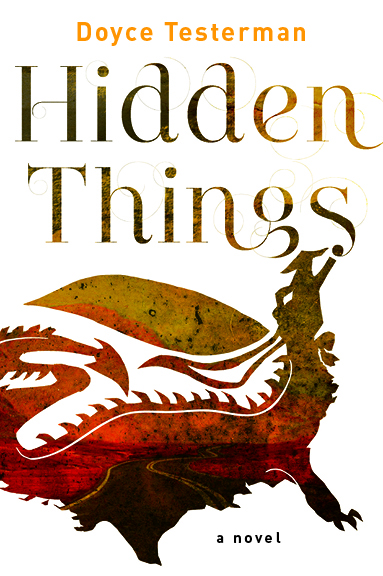
Publication date: 8/21/2012
Publisher: HarperCollins Voyager
ISBN-13: 9780062108111
Here there be dragons spoilers!
Seriously: if you haven’t yet read Hidden Things, we do not recommend continuing down this page — the discussion questions reveal much of the ending and a lot of what’s going on with the pivotal characters in the story.
Discussion Questions
1. Throughout the novel, the reader is introduced to numerous characters. Who was your favorite and why? Who did you identify with the most?
2. “No business transactions on this night [Halloween]. You know that as well as anyone, Vikous…” (p. 63) — Is that only Gluen’s rule or a rule amongst all the Hidden Things? If it is universally forbidden, as Calliope thinks (p. 80), why? How does this compare or contrast this with the typical Halloween activities in western culture?
3. As Calliope’s Guide, Vikous is unwilling to provide Calliope more information than she absolutely needs — less than many others (Gluen, Walker) think appropriate. What was his reason for this? Was he simply being a lazy Guide?
4. The Hidden Things (according to Mahkah) seem to require periodic ‘exposure’ to humanity in order to remain vibrant and alive — without that, they grow static and fade. Do you think the Hidden Things have always had this weakness? If yes, why? If not, when do you think this became a weakness of theirs?
5. Joshua essentially put his life and/or soul in the hands of Calliope, by trusting Mikey and agreeing to his brother’s terms for his release. What else could he have done in that situation?
6. One recurring theme in the story is the idea of grief and coping with loss: what symptoms of grief and grieving does Calliope display? Is Calliope’s grief solely for Josh, or are there other ‘losses’ in her life with which she still seems to be coping (or not coping)?
7. The meaning of “home” and “family” in the story is a recurring theme, especially regarding returning home after having left. What examples of this from any of the characters can you find within the story?
8. One of the major themes in the story might be “Growing up (or, in some cases, change) is hard but necessary.” Name some examples.
8a. Who in the story seems to embrace the idea of change, who resists it? Does anyone in the story change their stance on this as the story progresses?
9. Childhood memories figure prominently within the story. Can you name any examples?
10. “Magic goes away…. It just happens. Piece by piece, it dies…. People die and dreams die and hope dies and magic dies and the world just… comes in and covers it up.” (pp. 319) This passage describes a fairly hopeless outlook for the Hidden Things. Is this an unavoidable fate? How do the various Hidden Things in the story view and deal with this?
- Vikous
- Gluen
- Walker
- Kopro/Faegos
- Gerschone
- Mahkah
For the Moderator Only
Answers to a few of the Questions to help you look Really Smart during the Discussion. (Of if the group is stuck.)
7. What examples of home and family can you find within the story?
- Mikey to Josh, “Head home? You are home, Josh. I thought you knew that” (p. 6)
- Discussion of Calliope’s habit of getting halfway (or more) to her destination and then turning around and going home (pp. 124, 224)
- Vikous tells Calliope that she’ll never truly be home until she completes her quest (p. 125)
- Josh and Calliope’s argument (10 miles from her parents’ house), culminating with Josh saying, ironically, “Let’s go home.” (pp. 245-247)
- Argument between Calliope and Sandy (pp. 282-287)
- Calliope confronts Mikey about making Josh come to him instead of him going to Josh — how much Josh loved him and wanted a family (p. 321)
8. Examples of “Growing up (or, in some cases, change) is hard but necessary.”
- Calliope was more hurt here by Josh saying he (and, by implication, she) needed to “grow up” than by “anything he’d yet said.”
- The exchange between Josh and Mikey about whether growing up is inevitable (p. 226)
- Calliope tells Mikey that Josh had grown up (p. 322)
- Calliope and Sandy also talk about the realities of growing up (pp. 285-286)
- Vikous and Walker argue the need for risking interaction with outsiders (presumably humans) in order for their society to evolve and, hence, survive
- Mahkah says, “WE PROGRESS — WE CHANGE — ONLY BY SHARING OUR EXISTENCE WITH YOU” (p. 313)
- Calliope tells Mikey, “That’s how you get to a place where you could kill your own brother for company — by never moving.” (p. 322)
9. Childhood memories prominent within the story.
- Josh mentions Red Rover several times (p. 28 — again on p. 160)
- Jungle gyms (multiple times)
- “Nursery rhyme words” (p. 206)
- Calliope sings “lullabies she hadn’t known she remembered” (p. 208)
- Discussion about playground slides (p. 216)
If you’d like to look up reading guides for other books, or see how one is properly built, please visit HarperCollins.com/Readers.

